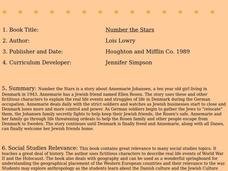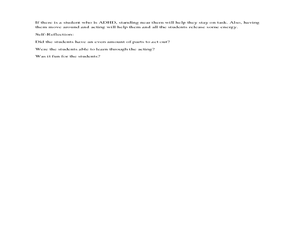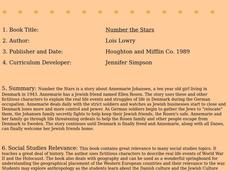Red River Press
Remembrance Day, Lest We Forget
Have we forgotten? As part of their study of Remembrance Day, class members consider whether countries have kept their promise not to forget and create their own remembrance ceremony.
Smithsonian Institution
Spanish American War
Today, Cuba and America sometimes struggle with diplomatic relations, but did you know that America went to war against Spain to free Cuba? Learners examine many interesting facts related to the Spanish American War using an informative...
Curated OER
Mapping and Personifying Nations
Eleventh graders analyze the geography, actions, and relationships of countries involved in World War II. They create a map of Europe, Northern Africa, and the Pacific, and analyze and evaluate their self-made map of Europe and the...
Curated OER
Number The Stars
Students read a book about prejudices that occur in our daily lives. They describe characters in the book. Students discuss real life events of World War II and the Holocaust. Students simulate hiding Jews from the German soldiers. ...
Curated OER
Post-WWII De-Colonization
The end of WWII brought big changes around the world, not the least of which occur in the increasingly decolonized continent of Africa. This slideshow details the developing countries of Ghana, Kenya, Congo, Nigeria, and South Africa, to...
Curated OER
Daniel's Story Study Guide
Students explore the concept of prejudice. In this World War II lesson, students read Daniel's Story by Carol Matas. Students complete the provided study guide as they read the novel and discuss the Holocaust.
Curated OER
Introduction to the Cold War
Students examine the domino theory. In this cold war lesson, students watch a video about dominos and then get into groups that represent different nations. Students will then act out a mock simulation of the containment and domino theory.
Curated OER
Total War
High schoolers view a video about the result of using atomic weapons during World War II. They examine how human rights are violated during wartime. They listen as family members come and speak to the class about their experiences...
Curated OER
The Great Depression
In this Great Depression study guide worksheet, students respond to 18 short answer questions. The questions correlate to assigned readings in a textbook.
Curated OER
American Becomes a Colonial Power
Exploring the idea of America joining "the imperialist club" at the end of the 19th century, this presentation presents reasons why America not only had the drive to explore the world, but the power and wealth with which to do so....
DocsTeach
The Impact of the Immigration Act of 1924
Welcome to America ... only if you're on an approved list. The activity uses a map to explain how the Immigration Act of 1924 placed quotas on immigration from certain countries, such as India. Scholars analyze the map, complete a...
Miami-Dade County Public Schools
Veteran's Day—Honoring All That Served
Looking for ideas on ways to recognize Veteran's Day? Check out this 92-page packet that includes exercises designed for all grade levels. Reading passages detail the history of the holiday, research projects get individuals involved in...
Curated OER
Post-War Japan
Students research the conditions of post-war Japan. In groups, they examine the plans that were put into place for the country and identify the attitude of the Allies. To end the lesson, they discuss the changes that came about in their...
Curated OER
Killing Fields
Pupils view a television program that explores people's perceptions and expectations in war prior to and after WWI. They discuss the effects of trench warfare and write a journal entry or short oral report reflecting on their...
Curated OER
Number the Stars
Students read Number the Stars. In this social studies lesson, students read the story and use a map of western Europe and identify the countries involved in the war. Students locate the cities of Denmark that are discussed in the story.
Curated OER
Dr. Seuss Takes on Charles Lindbergh
Learners study the leaders of the isolationist movement within the United States and the causes of the isolationist movement, they recognize and compare the perceptions of both the isolationists within the US and those who took a more...
Curated OER
Geographic Context for War
Students explore the geography of Korea. In this Korean War lesson, students examine maps of the country and label landforms, bodies of water, climate, population centers, and neighboring countries to determine the significance of...
Curated OER
End of WWI: The Treaty of Versailles
After learning about the causes and closure of WWI, hand out this resource on that outlines the differences between Wilson's 14 Point Plan and the Treaty of Versailles. The class reads the information provided then analyzes two political...
Curated OER
The White Line - A One Act Play
Students discuss amendments of the Constitution that cover due process and discuss them in relation to the play "The White Line". They determine how national security measures conflict with the issues of due process during wartime. They...
Curated OER
Introduction to the Cold War
Students explore the correlation between the Cold War and the Domino Theory. In this history lesson, students watch a short video that exhibits the domino effect, then divide into small groups, each representing an assigned country, and...
Curated OER
World War Ii - Japanese American Internment
Ninth graders determine that nationality is not defined by race, especially in the United States. They group into teacher created dyads with eight pictures. Four pictures are of American citizens (multiracial representations), and...
Curated OER
The Vietnam War
Students analyze U.S. involvement in Vietnam. In this Vietnam War lesson, students listen to their instructor present lectures regarding the Cold War as well as the conflict in Vietnam. Students study U.S. involvement in the armed...
The New York Times
The Cold War: Crossword
This crossword puzzle focuses on clues related to The Cold War. It also has unrelated clues that would be a challenge to middle schoolers, but should be manageable to secondary students; particularly juniors taking US history. There are...
Curated OER
The End of United States' Occupation of Japan
Ninth graders examine and discuss reasons for end of U.S. occupation of Japan in 1952, locate surrounding Asian countries on map, explore changes to Japan after World War II, and discuss how changes in Japan impacted other countries.

























